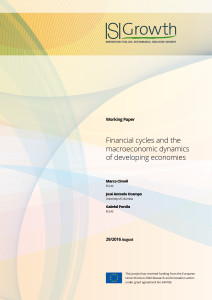This paper discusses the impact of financial cycles on the macroeconomic dynamics of developing economies. The main argument is that these cycles have a strong impact on key macroeconomic prices―in particular the real exchange rate―heightening external disequilibrium. The combination of an appreciated currency with subsequent external crises compromises investment, and therefore the accumulation of production capabilities and the upgrading of the pattern of specialization. In the long run, such capabilities and upgrading are crucial for sustaining growth. This implies that financial cycles can produce persistent effects on economic growth. The cases of Brazil and Argentina are compared with Korea and China: it is argued that in Asia the RER has been managed in such a way as to privilege the objective of competitiveness in macroeconomic policy, while in Latin America was used mainly as an anti-inflationary devise. By doing so the Asian countries used macroeconomic policy as a complementary tool in the diversification of production and capabilities, and in building their National System of Innovations. Inversely, in the case of the Latin American countries, the BOP-dominance of the macroeconomic dynamics and the weakness of industrial policy reinforced the loss of capabilities and lagging behind.
Financial Cycles and the Macroeconomic Dynamics of Developing Economies
Mauro Cimoli
ECLAC
José Antonio Ocampo
University of Colombia
Gabriel Porcile
ECLAC

